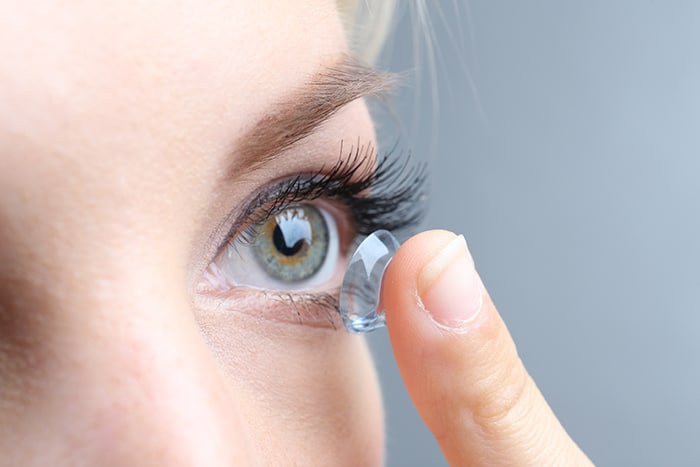Over 24 million people choose contact lenses to correct their vision. When used with care and proper supervision, contacts are a safe and effective alternative to eyeglasses. With today’s new lens technology, many people who wear eyeglasses can also successfully wear contact lenses.
Successful contact lens wear requires an extensive eye exam by an ophthalmologist or optometrist to determine if you are a good candidate. An initial fitting with lenses will be followed by training in our office on how to apply and care for the lenses and then annual checkups are scheduled to monitor your eye health and success. Annual exams are required, according to State law, for all annual prescription refills.

Soft contact lens insertion and removal instructions.
Contacts are thin, clear disks that float on the tear film that coats the cornea, the curved front surface of the eye. Contacts correct the same refractive conditions eyeglasses correct: myopia (nearsightedness), hyperopia (farsightedness) and astigmatism (an oval-rather than round-shaped cornea).
Contact lenses can be made from a number of different plastics. The main distinction among them is whether they are hard or soft lenses. Most contact lens wearers in the United States wear soft lenses. These may be daily wear soft lenses, continuous wear lenses or disposable lenses. Toric soft lenses provide a soft lens alternative for people with slight to moderate astigmatism.
If you wish to wear contact lenses, then please speak a Clemson Eye eye care professional to determine if this option is right for you.

Conventional lenses are used much less frequently today in the advent of planned replacement and disposable lenses, but they are still useful for patients with a very high or unusual prescription. Furthermore, conventional lenses require much more maintenance.
Contact lenses are a reasonable alternative to glasses to attain good vision. However, contact lenses are not without risk.
The most common complications occur due to poor hygiene or compliance. We recommend having a set of glasses in case you must discontinue use of your contact lenses due to problems. Annual exams by your eye doctor are highly recommended to avoid serious complications and ensure your ongoing eye health.
The following conditions are possible complications of contact lenses. You, the patient, must be aware of the potential hazards and accept these relative risks in addition to the benefits of contact lenses.
This occurs when a contact lens is worn longer than the cornea can tolerate. Not enough oxygen gets to the cornea resulting in temporary discomfort and blurred vision. The treatment is to discontinue wearing the contact lenses for a few days.
This is a “scratch” on the surface of the cornea resulting from a poorly fitting contact lens or possibly from foreign material under a contact lens. Over-wear can also cause an abrasion. Infection may result from this condition. Treatment includes antibiotics and a bandage contact lens. Infection may result from this condition.
In this condition, the eye becomes red and irritated in response to the cleaning and/or storage solutions or seasonal allergies. It is more often seen with soft contact lenses and usually is a reaction to the preservatives in these solutions. Treatment includes changing to different solutions and storage methods.
This is more often seen with soft and extended wear lenses. The lens, which had previously fit well, “tightens up” and does not allow tears and oxygen to reach the cornea. This can lead to a corneal abrasion. Treatment is to refit the lens.
This is usually due to contact lens over-wear, poor fitting lenses or inadequate follow-up. Occurs most frequently with hard and gas permeable lenses, but can occur less frequenctly with soft lenses. In this condition, the shape of the cornea becomes altered in response to the contact lenses. If severe warpage occurs, the lenses may no longer fit well and discomfort results. Treatment includes discontinuation of lens wear until the warpage resolves, which may take weeks to months. During this healing time, vision may fluctuate, requiring a change in the glasses prescription one or more times. Occasionally, the warpage may not resolve and the astigmatism created may persist.
If you wish to wear contact lenses, then please speak a Clemson Eye eye care professional to determine if this option is right for you.